Content Assist
The Content Assist feature enables the selection and insertion of existing
code elements to complete partially entered code.
A list of possible code elements is displayed in relevant locations
within your files according to the context of your cursor, which you can
then select to be automatically entered into your code.
Each type of code element will have a unique icon. See PHP
Icons for a description of each of the icons.
|

|
Reserved
PHP Words
|
|

|
Functions
|
|

|
Templates
|
|

|
Classes
|
|

|
Interfaces
|
|

|
Constants
|
|

|
Variables
(public)
|
|

|
PHP
File Include Call
|
|

|
Namespaces
(PHP 5.3)
|
Content Assist works with the following elements: PHP Classes, Functions,
Variables, Constants, Keywords, Interfaces, attributes, values, nested
functions, names, syntax and include calls, as well as all user defined
Classes, Functions and Constants.
Note:
Content Assist
will also be available for JavaScript elements if JavaScript support was
enabled for the project. See Enabling
JavaScript Support in PHP Projects for more information.
Content Assist in PHPDoc
Block
Content Assist provides proposals for the PHPDoc tags:
-
@return - A type description.
-
@see - Documents an association to another element.
-
@throws - Documents an exception thrown by a method.
|
|
|
|

|
Example:
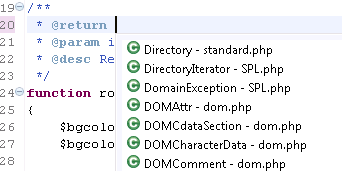
|
|
|
Templated Content Assist
Applying Content Assist proposals to the editor creates a templated
expression that provides argument completion according to the declaration
of the method. Templated Content Assist helps you edit your method parameters
quicker.
|
|
|
|

|
Example:

|
|
|
Using elements within the same scope
Elements within the same active project, file or function will be available
for use with Content Assist.
|

|
Examples:
-
Variables within a function will be added to the Content
Assist list when the cursor is within that function.
-
Elements defined within one file will be available in
the Content Assist menu in other files within the same project.
|
Function
Parameter Hints
When entering a function call, a Function Parameter Hint box will be
displayed detailing the types of parameters which should be entered within
the parentheses of the function call.
|
|
|
|

|
Example:

|
|
|
If the Function Parameter Hint box is not displayed automatically, place
your cursor between the parentheses and press Ctrl+Shift+Space.
Content Assist for Include Statements
Content Assist can be activated
for require and include calls to call files contained within the same
project.
Inserting quotation marks between
the parentheses of an include/require call will cause the Content Assist
window to display the files available for the function. Selecting a file
will complete the include/require call.
Class Type Hints
By using a comment you can assign a variable its exact class value.
This assignment will affect the content assist of this variable accordingly.
|
|
|
|

|
Example:
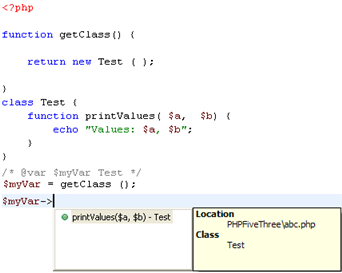
|
|
Note:
Without the comment, content assist will not
be available for the function.
|
By using a comment you can assign
a variable its exact class value. This assignment will affect the content
assist of this variable accordingly.
To assign a variable its class value
using a comment:
-
Create your function
and assign variables to it.
-
Enter a comment
in the form:
/*
@var $"new variable" "Class name" */
Content Assist for Magic
Members
Zend Studio supports
Content Assist options for 'magic members'. These are properties and methods
which were declared using the @property or @method tags within PHP
DocBlock comments rather than in the PHP script itself.
See http://manual.phpdoc.org/HTMLSmartyConverter/PHP/phpDocumentor/tutorial_tags.property.pkg.html
for more information on magic members.
|
|
|
|

|
Example:
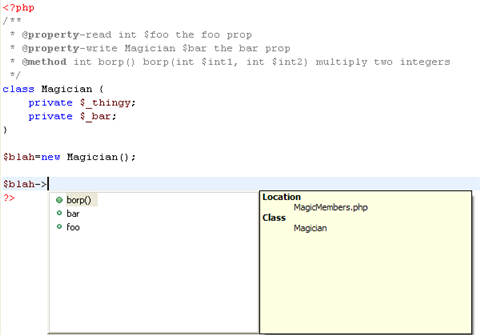
|
|
|
Camel Case Matches
Content Assist supports camel case matches when entering code, which
displays Content Assist options based on an element's initials.
|
|
|
|

|
Example:
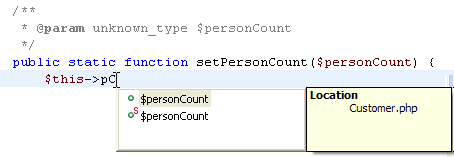
|
|
Note:
Camel Case matching is case sensitive.
|
Namespaces
When the PHP executable used for
the project is set to version 5.3, content assist is available for namespaces.
Namespace elements are represented
by the Namespace icon  .
.
|
|
|
|

|
Example:
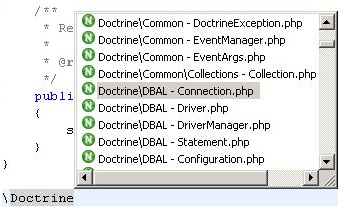
|
|
|
Configuring
Content Assist
To configure PHP Content Assist options, go to the Content
Assist Preferences page, accessible from Window
| Preferences | PHP | Editor | Content Assist.
To configure JavaScript Content Assist options, go to the JavaScript
Content Assist Preferences page, accessible from Window
| Preferences | Web | JavaScript | Editor | Content Assist.

![]()
![]()
![]()
![]()
![]()
![]()
![]()
![]()
![]()









